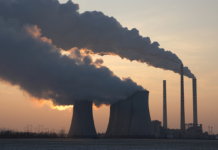
Joe Biden may have campaigned on eliminating the death penalty, but now as president, he appears to be ushering in the death penalty for reliable, affordable energy. In one fell swoop, Biden may go down as the one who replaced America’s energy dominance with dumbinance.
His preferred tool of death: the executive order.
On his first day in office, President Biden unleashed an avalanche of executive orders that made it very clear that he and his administration were anti-coal, anti-oil, and anti-natural gas. Of course, this means consumers, businesses, and good jobs will be collateral damage from the firing squad.
The two most damaging parts of his Day One executive orders were rejoining the Paris Agreement and canceling the permit for the Keystone Pipeline (KXL).
The Paris Agreement is problematic for at least three reasons. First, it will have a trivial impact (0.05° C) on any warming we could expect, even if all the member countries fully achieve their targets and if we can even attribute the temperature change to these actions. Second, China, the largest emitter of CO2, makes no commitment to do anything about its emissions before 2030 and commits to only weak, unenforceable efforts afterward. Third, despite the green-jobs rhetoric, meeting the Paris targets will strangle energy production, increase energy costs, be a big drag on the economy and kill jobs.
During the debates over leaving the Paris Agreement in 2017, colleagues and I used a clone of the Department of Energy’s NEMS model (including the associated economy-wide macro model) to estimate the economic impact of remaining in the Paris Agreement. We projected employment would fall nearly 400,000 jobs below that of an economy without the Paris Agreement. More than 200,000 of those lost jobs would be in manufacturing. The aggregate GDP loss would be more than $2.5 trillion.
That is bad enough, but Biden’s climate envoy, John Kerry, acknowledges that the Paris Agreement would have insufficient impact on climate change and argues that much more needs to be done. If so, then we should expect much higher costs than those noted above.
This runs contrary to the Trump administration that implemented policies to strengthen the energy renaissance unfolding in the U.S. over the past two decades. Proof of this renaissance came in the form of energy independence. The year 2019 was the first since 1957 that the U.S. was energy independent. Among the policies pushing for greater energy dominance was the approval of the KXL Pipeline. This addition to our petroleum transportation network would bring more oil to our world-leading Gulf-Coast refineries. President Biden canceled this nearly completed pipeline and more than ten years of work on it — literally. The damage from this cancelation goes beyond creating energy bottlenecks and forcing oil to use travel via less safe and less efficient ground transportation. Canceling the permit nixed thousands of well-paid construction jobs with the stroke of a pen and sent shock waves throughout the energy industry.
What shall these newly unemployed workers do? The same John Kerry who said private jet travel was the “only choice for somebody like me” displayed the same let-them-eat-cake attitude towards those who lost good jobs. He told them to make solar panels. To do so, they might have to move to China, where 70% of solar panels are made.
Though the immediate effects of stopping the KXL project are bad enough, looking down the road, energy investors would have to be skittish about any project that could run afoul of the Biden administration’s CO2 program and get canceled at any stage of completion.
And not running afoul can only get trickier. Executive Order 13990, another death tool of the Biden administration, authorizes agencies to undo all Trump-era deregulation as they see fit. It also explicitly directs the EPA to consider new comprehensive emissions-regulations of methane and volatile compounds at every stage of oil and gas production and distribution. It is almost like the president is embarrassed our energy industry is so strong.
With gasoline prices near $4.00 per gallon in 2011, President Obama declared, “We can’t just drill our way out of the problem.” In case it was not clear what he meant by “problem,” in 2012, he stated, “You know we can’t just drill our way to lower gas prices.” Few statements have been proven more wrong, more quickly than those two. The oil and gas industry drilled our way to being the world’s largest energy producer, and, indeed, prices fell dramatically.
His former vice president is putting a new twist on Obama’s old assertion. Instead of saying, “We can’t just drill our way of the problem,” President Biden seems to be saying, “You just can’t drill,” and that’s the problem.
About the author: Dr. David Kreutzer is a senior economist at the Institute for Energy Research. A native of Fairfax County, Virginia, Kreutzer earned his undergraduate and master’s degrees from Virginia Tech and received the first Ph.D. in economics from George Mason University. He taught economics for 23 years at James Madison University and for three years before that at Ohio University. He has published in peer-reviewed journals such as The Journal of Political Economy, Climate Change Economics, The National Tax Journal, Economic Inquiry, and Applied Economics.














